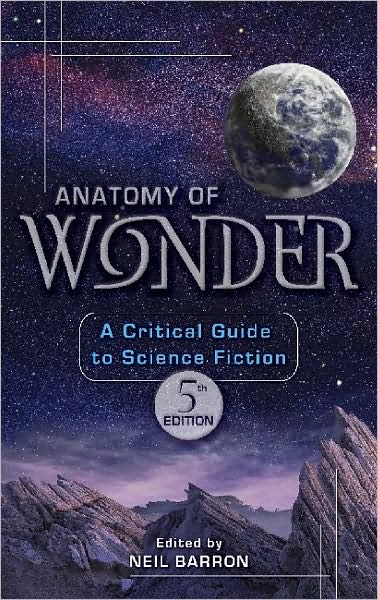Anatomy of RJS

I visited Toronto's Merril Collection of Science Fiction, Speculation and Fantasy on Tuesday, and had a look at the expensive but comprehensive standard reference work Anatomy of Wonder: A Critical Guide to Science Fiction, edited by Neil Barron. I own an old edition from the 1980s, but the Merril had the most recent one, the Fifth, from 2004.
The book contains hundreds of capsule reviews, and a list of the field's "Best Books." Four of my titles were reviewed (which is a lot; most authors are represented by only one or two works, if at all), and two of the reviews were starred (meaning, in the reviewer's opinion, they belonged on the list of the Best Books); the reviews of my work were all by academic Michael Levy, past president of the Science Fiction Research Association.
A blue-ribbon panel of the top critics in the science-fiction field were invited to concur or disagree with the principal reviews. That panel included John Clute (Hugo-winning co-editor of The Encyclopedia of Science Fiction), Don D'Ammassa (long-time book reviewer for Science Fiction Chronicle), James Gunn (director of the Center for the Study of Science Fiction at the University of Kansas), and David G. Hartwell (co-editor of The New York Review of Science Fiction).
Here are excerpts from the reviews by Michael Levy of my novels (the entries in the actual book are longer, and contain plot synopses):
Calculating God
Sawyer does a fine job of developing both his human and alien protagonists. This is an unusually thoughtful novel, which finished second for the Hugo Award and features serious discussion of issues not often considered in science fiction. Compare Blish's A Case of Conscience. [And Calculating God was named to the "Best Books" list by David G. Hartwell.]
Factoring Humanity
Sawyer's novel differs from most tales of first contact in that it centers on important, but small-scale effects such an event might have on individual human beings. Compare Sagan's Contact.
Hominids * [starred review]
Sawyer does a brilliant job of highlighting the differences between human and Neanderthal society. Later, equally well-done volumes in the series are Humans and Hybrids. [Hominids was also named a "Best Book" by both David G. Hartwell and John Clute, and Clute added "and sequels," meaning that in his view Humans and Hybrids qualify as "Best Books," too.]
The Terminal Experiment * [starred review]
[A] well-done thriller. More-action oriented than most of his later work, this novel nonetheless features Sawyer's trademark interest in the thoughtful extrapolation of important ideas. Compare Cadigan's Synners. [Also named a "Best Book" by John Clute, Don D'Ammassa, and James Gunn.]
In total, that puts all of these on the "Best Books" list: Calculating God, Hominids, Humans, Hybrids, and The Terminal Experiment. Needless to say, I'm delighted.
Visit The Robert J. Sawyer Web Site
and WakeWatchWonder.com
Labels: Reviews



0 Comments:
Post a Comment
<< Home